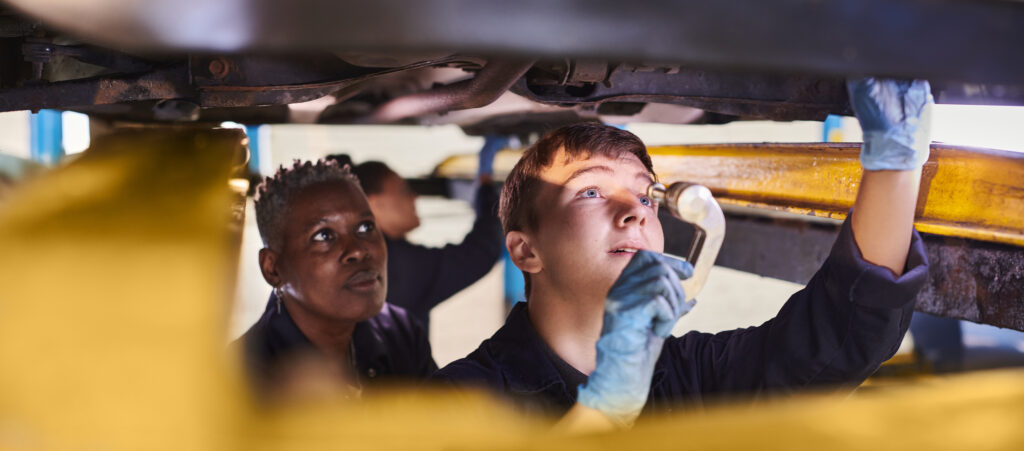
Lighthouse Futures Trust: Breaking down barriers to employment for neurodivergent young people
“These young people had often been all but written off, but they just needed a chance.” Find out how supported-internships are changing lives in Leeds.
Social Problem
While many young people are struggling to find work at the moment, there are even more barriers to employment for those with special educational needs. Fewer than 5% of adults with a registered learning disability or autism are in paid employment.[1]
Nicola Woods is the Business & Finance Manager at Lighthouse Futures Trust. She says, “Katie Parlett and four other women set up the very first free school for neurodivergent children in the country. The school has been really successful. Katie then recognised that schools were building our young people up, giving them confidence, making them feel like they could do anything, and then they were leaving school and had nowhere to go.” There was no continual provision to support them.”
Organisation
Katie decided to set up Lighthouse Futures Trust (LFT) – a specialist college for young people with a learning disability, autism or other educational need. Students gain work experience through internships with employers such as John Lewis, HMRC, Arla Foods and the NHS. The young people are supported by a job coach throughout their internship. LFT also runs a pre-internship programme where students can gain employability, social and independence skills before starting their work placement.
Nicola says, “A whole range of young people come through our doors. Some are highly intelligent but are debilitated by social anxiety; others need more time to learn. Just because someone thinks a bit differently doesn’t mean they’re not worth employing. In fact, some roles are particularly suited to the young people we work with. They can often bring a different set of skills to a workplace, which should be championed.”
LFT also runs Leeds Inclusive Employers Network to help break down barriers to employment. Nicola explains, “People from businesses across the city come to learn how they can be more inclusive. We might talk about how they could improve their recruitment process by giving the interview questions out beforehand and making the application form more straightforward or we might learn about upcoming legislation that we all need to know how to implement at work.”
Loan
LFT was leasing a large building in Headlingley, Leeds, for £125,000 a year. Alongside the cost, the uncertainty of leasing was taking its toll on the team. Nicola shares, “Even on a seven-year lease, there’s always a danger that the landlord will decide to sell or increase the rent. There were a couple of years where we never knew from one month to the next whether we were going to be renewing our lease or not, so it was pretty stressful.”
LFT was able to buy a new building in the same area with the help of a Charity Bank loan and a 50% grant/50% loan from the People’s Postcode Lottery. The loan repayments are around half what LFT was spending on rent, which means there’s more money to spend on other essentials and enrichment activities. Nicola says, “Before, I’d have to say “no” to everything, but now I can say “yes” to more things. We’ve been able to lease a minibus and build up our reserves to give us more financial stability.”
The college has created a Practical Assessment Exploration System (PAES) lab in the new building. The lab is the first of its kind in the UK and has 100+ work-related tasks for students to complete. Nicola explains, “The tasks cover various sectors, from business and marketing to consumer services, computing and construction. For example, a hospitality task might be weighing ingredients. As well as being a way to practise the kinds of tasks they might encounter in a workplace, it’s a really good way for students to find out what they like and what they’re good at.”
Impact
Many of the students are offered a permanent job when their internship ends. Others are supported by LFT to find a new job or meaningful volunteering opportunity. The goal for most supported-internship programmes is for 60% of the students to progress into paid work. LFT are getting more than 80% into paid work. Whatever they end up doing, it’s a positive outcome because the young people are being enabled to start living their lives.
“Charity Bank was supportive right from day one. They were just brilliant, completely understood what we were trying to do and wanted to help us. From our point of view, we couldn’t have had a better relationship.”
Nicola Woods, Business & Finance Manager at Lighthouse Futures Trust
“My supported internship with Lighthouse Futures Trust has changed my life. I’ve gone on to do things I never thought I’d be able to. I now work for the NHS doing a job I’m really proud of, with a team who understand me.”
Josh, LFT alumni
[1] https://www.base-uk.org/employment-rates
About Charity Bank
Charity Bank is the loans and savings bank owned by and committed to supporting the social sector. Since 2002, we have used our savers’ money to make more than 1380 loans totalling over £580m to housing, education, social care, community and other social purpose organisations.
Nothing in this article constitutes an invitation to engage in investment activity nor is it advice or a recommendation and professional advice should be taken before any course of action is pursued.


